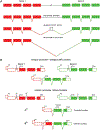Mutation-associated fusion cancer genes in solid tumors
- PMID: 19509239
- PMCID: PMC6948837
- DOI: 10.1158/1535-7163.MCT-09-0135
Mutation-associated fusion cancer genes in solid tumors
Abstract
Chromosomal translocations and fusion oncogenes serve as the ultimate biomarker for clinicians as they show specificity for distinct histopathologic malignancies while simultaneously encoding an etiologic mutation and a therapeutic target. Previously considered a minor mutational event in epithelial solid tumors, new methodologies that do not rely on the detection of macroscopic cytogenetic alterations, as well as access to large series of annotated clinical material, are expanding the inventory of recurrent fusion oncogenes in both common and rare solid epithelial tumors. Unexpectedly, related assays are also revealing a high number of tandem or chimeric transcripts in normal tissues including, in one provocative case, a template for a known fusion oncogene. These observations may force us to reassess long-held views on the definition of a gene. They also raise the possibility that some rearrangements might represent constitutive forms of a physiological chimeric transcript. Defining the chimeric transcriptome in both health (transcription-induced chimerism and intergenic splicing) and disease (mutation-associated fusion oncogenes) will play an increasingly important role in the diagnosis, prognosis, and therapy of patients with cancer.
Conflict of interest statement
Disclosure of Potential Conflicts of Interest
F. Kaye is a coinventor on a patent for molecular diagnosis of Crtc1-Mam12 tumors.
Figures

References
Publication types
MeSH terms
Substances
Grants and funding
LinkOut - more resources
Full Text Sources
Other Literature Sources

